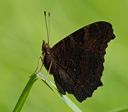Hodges#4433.1
Aglais io
Classification
- Phylum: Arthropoda
- Subphylum: Hexapoda
- Class: Insecta
- Order: Lepidoptera
- Superfamily: Papilionoidea
- Family: Nymphalidae
- Subfamily: Nymphalinae
- Tribe: Nymphalini
- Genus: Aglais
- Species: io
Pronunciation
How to pronounce Aglais io: /ˈæɡlaɪəs ˈiːoʊ/
These audio files are automatically generated. While they are not always 100% accurate, they are a good starting point.
Images






Summary
Aglais io, or the peacock butterfly, is a colorful butterfly found in Europe and temperate Asia, known for its striking eyespots and its role in research regarding anti-predation. It exhibits hibernation behavior, territorial male interactions, and has adapted various defense mechanisms against predation.
Physical Characteristics
Wingspan of 50 to 55 millimetres; base colour is rusty red with distinctive black, blue, and yellow eyespots at each wingtip; underside is cryptically coloured dark brown or black; caterpillars shiny black with six rows of barbed spikes and a series of white dots.
Identification Tips
Look for the distinctive large eyespots on the wings, which are black, blue, and yellow.
Habitat
Found in woods, fields, meadows, pastures, parks, and gardens, from lowlands up to 2,500 metres (8,200 ft) elevation.
Distribution
Europe and temperate Asia as far east as Japan; documented in the Montreal area starting in 1997.
Diet
Caterpillars feed on stinging nettle (Urtica dioica), hop (Humulus lupulus), and small nettle (Urtica urens); adult butterflies drink nectar from a variety of flowering plants including buddleia, dandelion, and clover.
Life Cycle
The peacock butterfly hibernates over winter, lays eggs in early spring, and undergoes complete metamorphosis from egg to caterpillar to chrysalis to adult.
Reproduction
Mating is monogamous; females receptive only during an eclosion period after overwintering; lays up to 400 olive green ribbed eggs on host plants.
Predators
Avian predators include blue tits and pied flycatchers; rodent predators encountered during hibernation such as small mice.
Ecosystem Role
Pollinator as an adult butterfly; part of the food web as both a caterpillar and adult.
Cultural Significance
Named after Io, a figure in Greek mythology; known for its beauty and research influence on anti-predatory mechanisms.
Evolution
Previously classified under the genus Inachis; demonstrates interesting adaptive traits related to mating and anti-predator mechanisms.
Misconceptions
Should not be confused with American peacocks in the genus Anartia, which are not close relatives.
Tags
- butterfly
- peacock butterfly
- Aglais io
- Nymphalidae
- Lepidoptera